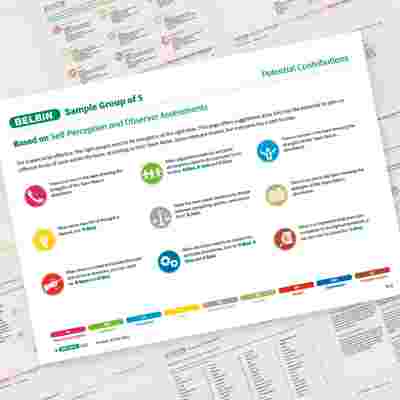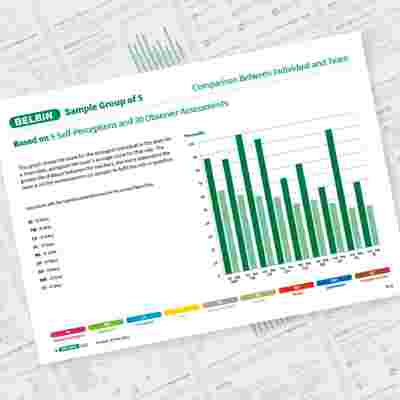What do you and your team want to achieve this year? Are you working on an important new project? Do you need to communicate more effectively to stop things slipping through the cracks? Is the right work reaching the right people?
Belbin is the perfect tool to help refocus and energise your team as we all look forward to a new year, and the Belbin Team report is a great place to start. This offers a ‘diagnostic’ of your team – its strengths, potential pitfalls and plenty of suggestions and discussion-starters to help you work smarter.
Sounds good?
To get hold of a Team report, you’ll need each person in your team to complete the Self-Perception Inventory, then to request Observer Assessments, or feedback, from the other team members. This gives a rounded view of each person’s individual strengths.
At Belbin, we can collate and analyse this data to produce the Team report, giving you that all-important overview.
Here’s what a Team report can do for your team.
1: Understand your team’s culture
Whether your team is brand new or well established, it’s important to begin with the fundamentals: your strengths and weaknesses as a team.
In new teams, there are lots of unknowns. In established teams, there can be complacency and assumptions – implicit social contracts which go unchallenged.
The Team Role Averages page of your report offers an overview of the team’s Team Role make-up, along with some insight into best- and worse-case scenario for the team.
The Overall Observer Responses drills down into the detail, examining team culture in terms of the most commonly-ticked words and phrases for the team.
In conjunction, these pages can be a useful starting-point for discussions. Does the team agree with the comments here? Are there any surprises? Anything they would wish to change?
2: Make strengths-based working your everyday ‘go-to’
Just like your gym membership, Belbin only works if you stick at it.
Once you know the strengths in your team, the Team Role Circle is an ideal way to bring Team Role strengths into meetings, project planning and more. This page gives you an at-a-glance view of strengths in the team, so that you can see where the gaps and overlaps might be. It could be that some team members are called on to play other roles in their arsenal, for the sake of the team.
If people need to shift roles or form sub-teams to work on particular projects, it’s useful to draw up a Team Role Circle to be specific about who is doing what, to manage expectations and identify any potential difficulties the team might encounter. For more information on using the Team Role Circle as a team exercise, see here.
3: Delegate more effectively
What’s your rationale when it comes to delegating work?
Are you delegating enough? Too much? Are you ensuring that the right work lands on the right person’s desk? The Potential Contributions report page allows you to dive further into the workings of the team, by identifying how you might distribute work based on Team Role strengths. This can act as a useful prompt for discussions, especially if the findings represent a significant change from how delegation works now. Are there any gaps? If so, is this kind of work required and how can the team address what’s missing?


4: Future-proof your team
A new year gives us the opportunity to look forward and assess the team’s future needs, namely recruitment and succession planning.
Comparisons Between Individual and Team offers insights into the team’s dependency on certain individuals to play particular roles. The larger the gap between the highest-scoring individual and the team’s average, the more likely the team is to be dependent on that one person to fulfil that role. This page can help the team (or its manager) to strategise about how to share knowledge, develop particular strengths in others or seek out resources in the team or further afield.
You can find plenty of articles and team session ideas here. If you’re working on a project, why not check out this piece on setting up project teams? If you’re looking for more help and guidance, Belbin run accreditation courses and bespoke workshops to give your team a head start this year.
About the author: Victoria Brown is Head of Research and Development at Belbin Ltd. Her responsibilities include writing articles, web content and literature reviews; project managing development of new products; and commissioning and overseeing internal and external research projects into Belbin Team Roles.
This article has been kindly repurposed from Belbin Ltd and you can read the original here.
